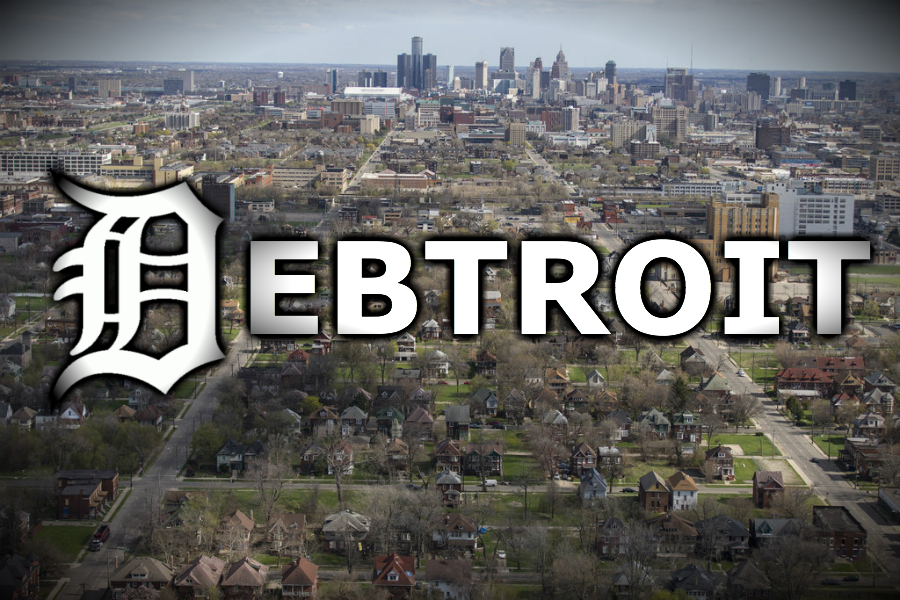Dispatch from Detroit: Debt-roit

Croatia, a small Mediterranean country of 4.4 million, just did an amazing thing: it wiped clean the debts of its 60,000 poorest citizens. Their Deputy Prime Minister, Milanka Opacic, said
They will be given a chance for a new start without a burden of debt.
The move will unfreeze bank accounts to nearly 20% of Croatians whose accounts were frozen last year for non-payment. Among the debts include in the mini-jubilee, or debt cancellation: “banks, telecommunication companies, major utilities, several major cities and municipalities as well as the government’s own tax agency. None will be refunded for their losses,” according to RT.com.
Detroit is also a metropolitan area of approximately 4.4 million people, so an obvious question is: Is Detroit in need of the same kind of debt cancellation program? The simple answer is: yes, and then some. A 2011 World Bank study found that only 7% of households in Croatia have mortgage debt. In metro Detroit, which includes the more affluent suburbs, nearly half of Generation X’ers are underwater on their mortgages. A more vulnerable majority of the urban population doesn’t even have mortgage debt because they can’t afford to buy a home: they’re a permanent renter class. That same World Bank study estimated that “1 of every 10 households faces financial distress” in Croatia. In Detroit, half of the city lives at or below the poverty level.
How many Detroiters would qualify for debt cancellation if they lived in Croatia?
Let’s look at the program qualifications:
Their debt must be lower than 35,000 kuna ($5,100):
Average Detroiter holds $23,604 in household debt, thousands more in questionable “public debts” like water department’s $5 billion debt ($1,100+ per family). None of these debts resolved in city’s bankruptcy.
Their monthly income should not be higher than 1,250 kuna ($138):
Below the poverty level in Croatia is considered 22,145 kunas ($4,343) per year or less, so to qualify in Croatia Detroiters would have to be under 65% of poverty income, or earning $1656 /year or less. A 2014 United Way study found that 67% of Detroiters are under the poverty line. The ultra-poor in Detroit: 18,000 un-housed people, 14% (officially, at least) unemployed.
Those applying for the scheme are not allowed to own any property or have any savings:
50% of Detroiters have no bank account, 40.5% are renters not owners.
There’s another thing that Croatians and Detroiters have in common: high levels of child poverty. It’s risen higher in Croatia than any other European Union country, at a rate that UNICEF calls “alarming”. In Detroit it’s risen faster than in any other major city in the U.S. Most alarmingly, Croatia’s infant mortality rate (# deaths/1,000 live births) may be slightly higher than the U.S.’s at 5.6 to America’s 5.2, but it dwarfs Detroit’s by a factor of three: a full 15 infants in Detroit die out of every 1,000 born alive. The national nurses union recently declared a public health emergency in the city of Detroit, and is calling on a financial transaction tax – aka “Robin Hood Tax” – to pay for direly-needed health infrastructure improvements for the poor.
Upon comparing these startling statistics, the question becomes less one of “Could this happen here?” and more of “Why the f%@k has it not happened yet?” The country’s largest municipal bankruptcy did just about nothing to relieve the overwhelming debts of Detroiters, though it did allow a few large banks and corporations to grab at soon-to-be-valuable waterfront property and public parking lots.
A solution
You might say the kind of debt relief seen in Croatia would be unfeasible here in Detroit with the levels of indebtedness and the current political climate. OK, then let’s start small: first, let’s cancel the water debt and free up poor families from thousands of dollars in back-payments to a utility company whose former director is behind bars. The Detroit Water Brigade has a petition you can sign today calling on the city to do just that. It’s a start, right?

